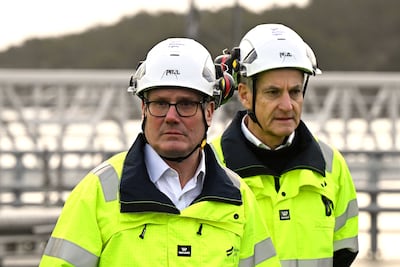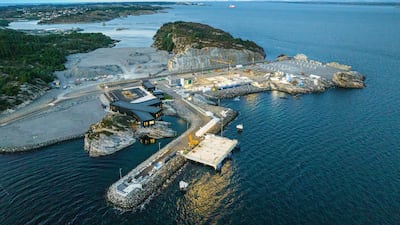If a business can’t stop emitting the greenhouse gases warming up the Earth, how about capturing the load, sending them to Norway and never to be seen again?
Dispatching unwanted CO2 across borders by pipeline and sea is about to become a reality. A project called Northern Lights will begin operations in Europe's far north in 2025, offering transport and storage deep under the sea “as a service”.
Several European countries are keen on the idea. Britain believes it can store 78 billion tonnes of CO2 on its continental shelf, more than the world’s annual emissions. Saudi Arabia and Britain said in 2024 they would work together on “carrying the message” in favour of the technology. Belgium and the Netherlands could act as stations on the route to the seabed.
In years to come there are plans for a fully-fledged pipeline known as the CO2 Highway criss-crossing the North Sea. Buried deep underwater, the carbon would never enter the Earth’s atmosphere where it traps heat and drives climate change and extreme weather.
The infant industry has had teething problems with its technology, and faces what insiders call a "missing money gap" between the cost of investment and the potential reward. There is also the risk of investing in CO2 storage only to find there are no ready customers.
Then there are political objections. Carbon capture and storage (CCS) is viewed with suspicion by climate activists, who see it as a get-out-of-jail-free card.
“There’s a whole set of objectors who are really trying to cancel CCS because they want to cancel oil and gas production,” said Stuart Haszeldine, a University of Edinburgh professor of carbon capture who has advised the UK and Scottish governments on the issue. He said he could understand why given the role of fossil fuels in driving global warming.
“The world’s left this for so long that there’s very few alternatives now,” he told The National. “You either cancel all oil and gas production, with huge social disruption and civilisational risk, or you have to try very hard to decrease fossil fuel use but capture and recapture as much CO2 as you possibly can.”
In the Northern Lights project, CO2 captured on land will be turned into liquid, sail to a terminal in Oygarden, near Bergen, which was completed in September, then be piped under the sea and injected into a rock formation 2,600 metres below sea level.
Absorbing risks
Some new CO2 emissions will arise from burning shipping fuel. The operators of Northern Lights say these will be 97 per cent lower than the volume of emissions being spared from the atmosphere.
“Northern Lights is offering a CO2 transport and storage service to a third party, to industry that wants to decarbonise,” Equinor’s vice president in charge of carbon capture, Torbjorg Heskestad, told a recent investor conference in London.
She also identified the risk to operators: “that we invest in transport and storage but there is no customer ready to supply CO2”. At present it costs less to emit than it costs to invest in carbon capture, she said. The first two customers are a Norwegian cement factory and a waste-to-energy plant in Oslo whose carbon capture facilities are state-funded.
“The Norwegians are really handling that by state ownership of most of the projects,” Prof Haszeldine said. “The state is taking on board that liability of cross-chain lack of delivery in the first part of the project.” Although Norway is not an EU member, Northern Lights “is still an essential project for Europe to realise and to work out”, he said.
Two more customers for Northern Lights have been identified in Denmark and the Netherlands. The UK also hopes to develop a commercial carbon capture industry, recently making £21.7 billion ($27.66 billion) of public money available over 25 years. On a recent visit to Norway, Britain's Prime Minister Keir Starmer agreed to work on a two-way arrangement to transport CO2 across borders.
Plans for the eventual CO2 Highway envisage more than 1,000km of pipelines connecting ports in northern Europe, including in Belgium and the Netherlands. According to the Global CCS Institute there are 50 global projects in operation, 44 under construction and 534 in various stages of development.
Super highway
A typical user is a factory or industrial plant where there is no easy alternative to burning fossil fuels, such as in steel, cement or chemicals manufacturing. A group of 23 pro-CCS countries including the UAE, Bahrain and Egypt who held talks at the recent Cop29 climate summit in Azerbaijan plan to get projects moving by 2030 that would store a gigatonne of CO2 every year.
Various other speakers decried carbon capture during Cop29 as a “false solution”, a “risky technology” or a “pipe dream”. Brazil, one of the countries to present a new emissions-cutting plan in Azerbaijan, said it would use carbon capture to enable an expansion of biofuel production. The UK-Saudi marketing campaign will seek to “build the awareness that is needed” of the advantages of carbon capture, British representative Kerry McCarthy said.
Several first-of-a-kind carbon capture projects have “had problems in getting going and problems in building up to their design capacity,” said Prof Haszeldine. “But those projects are working. They’re being improved all the time, and the second generation of projects following on will really learn from all of that and are expected to be both cheaper and more effective.”
Company%C2%A0profile
%3Cp%3E%3Cstrong%3ECompany%20name%3A%20%3C%2Fstrong%3ETuhoon%0D%3Cbr%3E%3Cstrong%3EYear%20started%3A%20%3C%2Fstrong%3EJune%202021%0D%3Cbr%3E%3Cstrong%3ECo-founders%3A%20%3C%2Fstrong%3EFares%20Ghandour%2C%20Dr%20Naif%20Almutawa%2C%20Aymane%20Sennoussi%0D%3Cbr%3E%3Cstrong%3EBased%3A%20%3C%2Fstrong%3ERiyadh%0D%3Cbr%3E%3Cstrong%3ESector%3A%20%3C%2Fstrong%3Ehealth%20care%0D%3Cbr%3E%3Cstrong%3ESize%3A%20%3C%2Fstrong%3E15%20employees%2C%20%24250%2C000%20in%20revenue%0D%3Cbr%3EI%3Cstrong%3Envestment%20stage%3A%20s%3C%2Fstrong%3Eeed%0D%3Cbr%3E%3Cstrong%3EInvestors%3A%20%3C%2Fstrong%3EWamda%20Capital%2C%20Nuwa%20Capital%2C%20angel%20investors%3C%2Fp%3E%0A
Company Profile
Company name: Yeepeey
Started: Soft launch in November, 2020
Founders: Sagar Chandiramani, Jatin Sharma and Monish Chandiramani
Based: Dubai
Industry: E-grocery
Initial investment: $150,000
Future plan: Raise $1.5m and enter Saudi Arabia next year
Engine: 3.5-litre V6
Transmission: eight-speed automatic
Power: 290hp
Torque: 340Nm
Price: Dh155,800
On sale: now
US households add $601bn of debt in 2019
American households borrowed another $601 billion (Dh2.2bn) in 2019, the largest yearly gain since 2007, just before the global financial crisis, according to February data from the New York Federal Reserve Bank.
Fuelled by rising mortgage debt as homebuyers continued to take advantage of low interest rates, the increase last year brought total household debt to a record high, surpassing the previous peak reached in 2008 just before the market crash, according to the report.
Following the 22nd straight quarter of growth, American household debt swelled to $14.15 trillion by the end of 2019, the New York Fed said in its quarterly report.
In the final three months of the year, new home loans jumped to their highest volume since the fourth quarter of 2005, while credit cards and auto loans also added to the increase.
The bad debt load is taking its toll on some households, and the New York Fed warned that more and more credit card borrowers — particularly young people — were falling behind on their payments.
"Younger borrowers, who are disproportionately likely to have credit cards and student loans as their primary form of debt, struggle more than others with on-time repayment," New York Fed researchers said.
COMPANY%20PROFILE%20
%3Cp%3EName%3A%20DarDoc%3Cbr%3EBased%3A%20Abu%20Dhabi%3Cbr%3EFounders%3A%20Samer%20Masri%2C%20Keswin%20Suresh%3Cbr%3ESector%3A%20HealthTech%3Cbr%3ETotal%20funding%3A%20%24800%2C000%3Cbr%3EInvestors%3A%20Flat6Labs%2C%20angel%20investors%20%2B%20Incubated%20by%20Hub71%2C%20Abu%20Dhabi's%20Department%20of%20Health%3Cbr%3ENumber%20of%20employees%3A%2010%3C%2Fp%3E%0A
Company info
Company name: Entrupy
Co-founders: Vidyuth Srinivasan, co-founder/chief executive, Ashlesh Sharma, co-founder/chief technology officer, Lakshmi Subramanian, co-founder/chief scientist
Based: New York, New York
Sector/About: Entrupy is a hardware-enabled SaaS company whose mission is to protect businesses, borders and consumers from transactions involving counterfeit goods.
Initial investment/Investors: Entrupy secured a $2.6m Series A funding round in 2017. The round was led by Tokyo-based Digital Garage and Daiwa Securities Group's jointly established venture arm, DG Lab Fund I Investment Limited Partnership, along with Zach Coelius.
Total customers: Entrupy’s customers include hundreds of secondary resellers, marketplaces and other retail organisations around the world. They are also testing with shipping companies as well as customs agencies to stop fake items from reaching the market in the first place.
Company%C2%A0profile
%3Cp%3E%3Cstrong%3ECompany%20name%3A%20%3C%2Fstrong%3ELeap%0D%3Cbr%3E%3Cstrong%3EStarted%3A%20%3C%2Fstrong%3EMarch%202021%0D%3Cbr%3E%3Cstrong%3EFounders%3A%3C%2Fstrong%3E%20Ziad%20Toqan%20and%20Jamil%20Khammu%0D%3Cbr%3E%3Cstrong%3EBased%3A%3C%2Fstrong%3E%20Dubai%0D%3Cbr%3E%3Cstrong%3ESector%3A%20%3C%2Fstrong%3EFinTech%0D%3Cbr%3E%3Cstrong%3EInvestment%20stage%3A%20%3C%2Fstrong%3EPre-seed%0D%3Cbr%3E%3Cstrong%3EFunds%20raised%3A%3C%2Fstrong%3E%20Undisclosed%0D%3Cbr%3E%3Cstrong%3ECurrent%20number%20of%20staff%3A%20%3C%2Fstrong%3ESeven%3C%2Fp%3E%0A
Profile of Udrive
Date started: March 2016
Founder: Hasib Khan
Based: Dubai
Employees: 40
Amount raised (to date): $3.25m – $750,000 seed funding in 2017 and a Seed round of $2.5m last year. Raised $1.3m from Eureeca investors in January 2021 as part of a Series A round with a $5m target.
Credit Score explained
What is a credit score?
In the UAE your credit score is a number generated by the Al Etihad Credit Bureau (AECB), which represents your credit worthiness – in other words, your risk of defaulting on any debt repayments. In this country, the number is between 300 and 900. A low score indicates a higher risk of default, while a high score indicates you are a lower risk.
Why is it important?
Financial institutions will use it to decide whether or not you are a credit risk. Those with better scores may also receive preferential interest rates or terms on products such as loans, credit cards and mortgages.
How is it calculated?
The AECB collects information on your payment behaviour from banks as well as utilitiy and telecoms providers.
How can I improve my score?
By paying your bills on time and not missing any repayments, particularly your loan, credit card and mortgage payments. It is also wise to limit the number of credit card and loan applications you make and to reduce your outstanding balances.
How do I know if my score is low or high?
By checking it. Visit one of AECB’s Customer Happiness Centres with an original and valid Emirates ID, passport copy and valid email address. Liv. customers can also access the score directly from the banking app.
How much does it cost?
A credit report costs Dh100 while a report with the score included costs Dh150. Those only wanting the credit score pay Dh60. VAT is payable on top.
Terror attacks in Paris, November 13, 2015
- At 9.16pm, three suicide attackers killed one person outside the Atade de France during a foootball match between France and Germany
- At 9.25pm, three attackers opened fire on restaurants and cafes over 20 minutes, killing 39 people
- Shortly after 9.40pm, three other attackers launched a three-hour raid on the Bataclan, in which 1,500 people had gathered to watch a rock concert. In total, 90 people were killed
- Salah Abdeslam, the only survivor of the terrorists, did not directly participate in the attacks, thought to be due to a technical glitch in his suicide vest
- He fled to Belgium and was involved in attacks on Brussels in March 2016. He is serving a life sentence in France
History's medical milestones
1799 - First small pox vaccine administered
1846 - First public demonstration of anaesthesia in surgery
1861 - Louis Pasteur published his germ theory which proved that bacteria caused diseases
1895 - Discovery of x-rays
1923 - Heart valve surgery performed successfully for first time
1928 - Alexander Fleming discovers penicillin
1953 - Structure of DNA discovered
1952 - First organ transplant - a kidney - takes place
1954 - Clinical trials of birth control pill
1979 - MRI, or magnetic resonance imaging, scanned used to diagnose illness and injury.
1998 - The first adult live-donor liver transplant is carried out
Tips%20for%20travelling%20while%20needing%20dialysis
%3Cul%3E%0A%3Cli%3EInform%20your%20doctor%20about%20your%20plans.%C2%A0%3C%2Fli%3E%0A%3Cli%3EAsk%20about%20your%20treatment%20so%20you%20know%20how%20it%20works.%C2%A0%3C%2Fli%3E%0A%3Cli%3EPay%20attention%20to%20your%20health%20if%20you%20travel%20to%20a%20hot%20destination.%C2%A0%3C%2Fli%3E%0A%3Cli%3EPlan%20your%20trip%20well.%C2%A0%3C%2Fli%3E%0A%3C%2Ful%3E%0A
Scores in brief:
- New Medical Centre 129-5 in 17 overs bt Zayed Cricket Academy 125-6 in 20 overs.
- William Hare Abu Dhabi Gymkhana 188-8 in 20 overs bt One Stop Tourism 184-8 in 20 overs
- Alubond Tigers 138-7 in 20 overs bt United Bank Limited 132-7 in 20 overs
- Multiplex 142-6 in 17 overs bt Xconcepts Automobili 140 all out in 20 overs
Polarised public
31% in UK say BBC is biased to left-wing views
19% in UK say BBC is biased to right-wing views
19% in UK say BBC is not biased at all
Source: YouGov
The specs
Engine: 3.8-litre V6
Power: 295hp at 6,000rpm
Torque: 355Nm at 5,200rpm
Transmission: 8-speed auto
Fuel consumption: 10.7L/100km
Price: Dh179,999-plus
On sale: now




